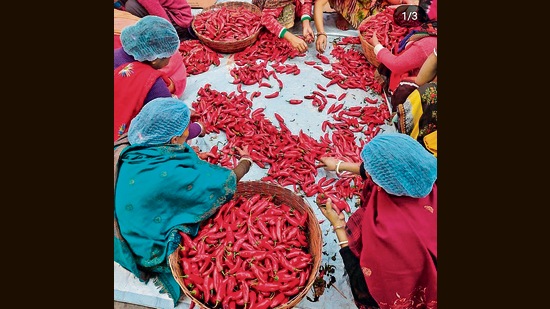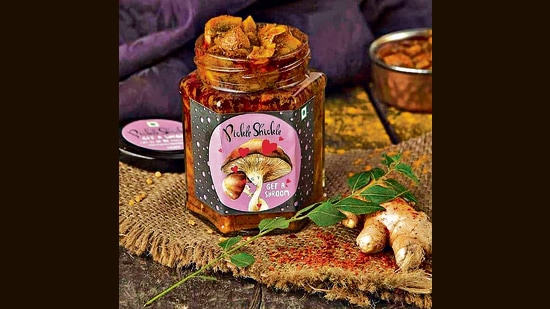Shakuntala Talwar was eight when her family fled Sindh during Partition. Travelling to Bombay on a chaotic passenger ship, “our mother made a protective wall, arranging the suitcases and pickle bottles… into a circle inside which we sat,” she would later tell her niece, the author and oral historian Saaz Aggarwal. The anecdote is tucked into Aggarwal’s 2012 book, Sindh: Stories from a Vanished Homeland.
The relationship we have with pickles is one that endures, Aggarwal says. People may leave home, their food habits may change and their cuisines may be altered over time (think of all the potato and green chilli in today’s Indian meals). There is little reason to ever alter a pickle.
Pickles are also convenient: they have a long shelf life, are ready to eat, one doesn’t need too much. They can be eaten in a sandwich or a roll, with instant noodles, as an addition to a salsa or a dip. Across the country, homegrown enterprises are cottoning on to this, promoting unusual pickles as a gateway to unfamiliar cuisines.
In Darbhanga, Bihar, 52-year-old Kalpana Jha’s JhaJi offers 20 traditional varieties (including yam, bitter gourd and jackfruit). Sheila Chacko Kallivayalil, 65, from Kerala runs Sheilas, with 14 varieties (prawn, different kinds of fish, brinjal, kandari chilli). NE Origins, a Gangtok-based startup run by Rewaj Chettri, 29, began operations in 2020 as a platform to connect lockdown-affected entrepreneurs in remote parts of north-east India. They offer pickles made using Nagaland’s king chilli, dalle chilli from Sikkim, bamboo shoot from Manipur and smoked pork from Nagaland.
“Achaar, across communities, is an emotion. The recipe for a perfect pickle is born of the rich culinary heritage that has been passed down and a great sense of discipline that goes into making it,” says Jha, who launched JhaJi in 2021. She uses local ingredients such as the hog plum or amra, which isn’t widely available anymore. Some recipes are simple but ancient; JhaJi does a Bihari stuffed mango pickle that’s just aam, yellow mustard seeds and black mustard seeds. “These recipes are so old that it’s hard to track down their origins, my grandmother learned it from hers,” says Jha.

Chettri found it harder to promote his regional recipes, partly because they were less familiar to much of India. People were apprehensive about the bhut jolokia (“I now get feedback saying the tanginess of this one goes perfectly with chips”). Bamboo shoot, with its distinct earthy flavour, took some getting used to. But, he adds, people realise that a bamboo shoot pickle might be a smarter way of trying a north-eastern cuisine than a whole restaurant meal.
Brine fever
As strong custodians of culture, pickles often take dying and forgotten traditions and stories forward, Aggarwal says. She recalls how many displaced Sindhis living in refugee camps struggled to find ways to sustain themselves. “They sold pickles to richer Sindhi families who no longer made their own pickles, papads and homemade snacks in Delhi. Vendors from refugee camps would go from door to door, carrying large sacks filled with goodies, and were a welcome link to the lost homeland.”

Some missions are more contemporary but also personal. Mumbai’s Gautam Agicha, 39, runs the food brand Gourmax with his mother Jyoti Motwani, 62, selling gourmet snacks, sweets and pickles since August 2020. He added a Sindhi mixed-vegetable pickle to the menu because he remembered what it had meant to him, growing up in boarding school. His mother’s careful packages were his only way to escape the bland school dining-room fare. It is among Gourmax best-selling items, he says. “Carrot, cauliflower, and dried dates are tossed in spices, mustard seeds and jaggery in this water-based pickle, making it a good mix of flavours that I loved even as a kid.”
For Delhi-based sisters Preetika Chawla, 34, and Prerna Chawla, 38, their multi-cultural lineage inspired the birth of Pickle Shickle in 2017, which offers a range of pork, chicken, prawn, mutton, lotus stem, mushroom and jackfruit preserves, all made using a Coorgi-East Indian recipe created by their grandmother.
Exchanging preserves is a great way to exchange notes on culture, says Preetika Chawla, who makes it a point to talk to her customers on the phone, “making many new friends”. One customer, Ateesh Chattopadhyay, 35, a sound designer, sent her his great-grandmother’s recipe for kasundi as a thank-you, adding that she could use the mustard sauce in her preserves if she liked.
“Pickles show how India is truly one country,” Aggarwal says. “Every region has its specialty but the basic ingredients – a fruit or vegetable, oil, salt, flavourful spices, sunlight, leading to a long shelf-life – remain the same.”
This winter season, get Flat 20% Off on Annual Subscription Plans
Enjoy Unlimited Digital Access with HT Premium

